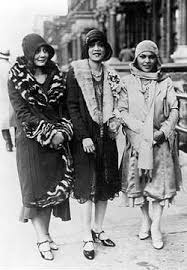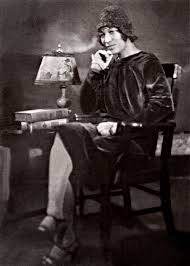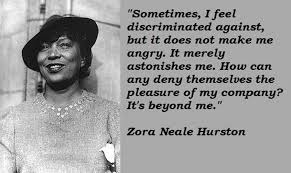The Namesake Analysis/Discussion Chp. 1 & 2; How It Feels To Be Colored Me
Let's go back to examining The Namesake, Chapter 1 this morning to continue examining the writing style going on here. Take a closer look at these passages:






"How it Feels to Be Colored Me" is an essay by Zora Neale Hurston. Take a moment to read a bit of information about Zora Neale Hurston, then we'll read the essay in class. Look closely at how the article opens (the hook, lead-in, thesis), and how it develops (the body, topic sentences, argument), and notice the sentence structure (length, diction, syntax). After studying some of these elements respond to the article in writing.
- Pg. 3 (1st full paragraph) to 4 (end of 1st full paragraph): How is Ashima's character compared/contrasted with the American women in the hospital? What do you notice about the sentence structure of this paragraph? What does the use of dialogue in this paragraph provide for the reader? What literary devices do you notice? Can you find figurative language/metaphor/alliteration or other elements of imagery? How are the sentences similar to a contraction (the action in the scene)?
- Pg. 10-12: how is Ashoke's character presented? How does his story parallel or contrast with his wife's? How is Ashoke different from the other American men in the waiting room? What details do we learn about him?
- Pg. 13-14: Nickolai Gogol and the short story "The Overcoat" is alluded to here. Just notice it for now. This allusion is important.
- Pg. 15-16: Review the dialogue between Ashoke and Ghosh. How might this dialogue become important? What wisdom or message does it give us as readers? How might the last line of dialogue be symbolic? [particularly in light of what is about to happen...?]
- Pg. 17-18: Let's re-read the train wreck. Notice the sentence structure of these paragraphs. Also, notice the use of imagery. Imagery includes more than just visual imagery, it is also sound, movement, taste, smell, and touch; it may include temperature or the sense of pain.
- Examine the structure of the chapter. The first 10 pages deal with one character (Ashima). The last 11-12 pages deal with a second character (Ashoke).
WRITING PROMPT IDEA: Write a story where you compare/contrast two separate characters. In the first part of your story, write a 3rd person objective POV over the shoulder of that character. Then, use white space to create a transition after the first "scene" or conflict. Write the second part of your story about the second character in contrast/comparison to your first. You might choose to tell this character's story in parallel with the timed events of your narrative in the first section (or the story can be a flashback or flash-forward).
Chapter 2: Blog Comment
In the comment section of this blog, for credit (see the homework rubric), please post a comment answering one of the following questions about chapter two:
- the second chapter continues to develop the two main characters Ashoke and Ashima. What conflicts arise as a result of Gogol's birth? How do the conflicts presented in chapter 2, have their roots or beginnings in what we learn about the characters in chapter 1? How does Lahiri connect the two?
- Examine the dichotomies--a division or contrast between two things--in this book and how they help develop characters/conflict/theme/setting/plot. Write about the significance of one and where it appears in either chapter 1 or 2: (a few sample dichotomies might include):
- Ashima/Ashoke
- American culture/Indian culture
- Father/Mother; Man/Woman; Parent/Child
- Freedom/Responsibility
- Tradition/Individuality
[Please make sure you state your name if it is not obvious so I can give you credit for your work!]
Period 2 (ish)

"How it Feels to Be Colored Me" is an essay by Zora Neale Hurston. Take a moment to read a bit of information about Zora Neale Hurston, then we'll read the essay in class. Look closely at how the article opens (the hook, lead-in, thesis), and how it develops (the body, topic sentences, argument), and notice the sentence structure (length, diction, syntax). After studying some of these elements respond to the article in writing.
- ESSAY PROMPT: What defines you? What single physical, mental, emotional trait defines you? Why? What is the significance of this trait?
- ESSAY PROMPT: Think about your own educational experience. How multicultural has your experience been?
- ESSAY PROMPT: Is there value in having a common culture (for example stressing the idea that we are all 'Americans' over fragmenting our culture)? Why or why not?
- ESSAY PROMPT: Does this idea of multiculturalism need updating? Is this issue still important--and, if so, why?
- ESSAY, PLAY, or MEDIA PROMPT: Choose a side (a dichotomy) and argue for or against it. Who (in our culture) is right in your opinion?
- MEDIA PROMPT: Interview 3 different people and ask them about their identity or cultural heritage. Is their culture a burden to bear, or are they, like Hurston, more optimistic? Record and edit your folklore to create a piece for your portfolio.
- POEM PROMPT: Hurston writes her optimistic essay in the bold, poetic style of the Modernists. She speaks of Jazz as some wild African predator. Choose a style of music or performance you like and compare it as a metaphor with some object or animal of your own choosing. Explain how the art form is also an animal or object and its effect on you.
- POEM PROMPT: Hurston uses the simile "I feel like a brown bag of miscellany propped against a wall" and continues to describe what is in her "bag" of self. If you were a bag or container or piece of luggage, what would we find inside you? How has the "Great Stuffer of Bags" (God) filled you?
- YOUR CHOICE: Don't like any of these? Use the article in some way to inspire a creative work of your own choosing.
WRITING TASK: Choose one (or more) of the prompts on this page and develop it into a draft. Your draft may be shared with your workshop group next class (or later) and should appear in your quarter portfolio.
HOMEWORK: Please read Chapter 3 of The Namesake. Write a draft of one of the prompts from today's blog post.
EXTRA CREDIT OPPORTUNITY: The Rochester Fringe Festival opened yesterday. Take a catalog and go see a performance this week (the festival runs through next Saturday, Sept. 21--take a friend or family member with you because it's more fun to see a show with someone!) My own original play "The Fighting Girl's Guide to Politics" is opening this weekend on Saturday and Sunday at the School of the Arts during the Fringe, and also runs through next week. Ms. Gamzon is directing an original play written by one of her friends and colleagues called "Colma". Ms. Accorso also has a play that she wrote in the Fringe. Go see our work, or go see any other show.
HOW TO GET EXTRA CREDIT: Write up a short summary of the show you saw. Then, comment on the performance. What did you learn about PERFORMING (acting, directing, singing, dancing, viewing, etc.) from watching the show or about writing (the content of the show or its story). What did you (or your friends) think of the show? Turn in your "review" and gain extra participation credit for this marking period. You may repeat this option as many times as you like. Go see 30 plays, get 30 points of extra credit! Etc.
EXTRA CREDIT OPPORTUNITY: The Rochester Fringe Festival opened yesterday. Take a catalog and go see a performance this week (the festival runs through next Saturday, Sept. 21--take a friend or family member with you because it's more fun to see a show with someone!) My own original play "The Fighting Girl's Guide to Politics" is opening this weekend on Saturday and Sunday at the School of the Arts during the Fringe, and also runs through next week. Ms. Gamzon is directing an original play written by one of her friends and colleagues called "Colma". Ms. Accorso also has a play that she wrote in the Fringe. Go see our work, or go see any other show.
HOW TO GET EXTRA CREDIT: Write up a short summary of the show you saw. Then, comment on the performance. What did you learn about PERFORMING (acting, directing, singing, dancing, viewing, etc.) from watching the show or about writing (the content of the show or its story). What did you (or your friends) think of the show? Turn in your "review" and gain extra participation credit for this marking period. You may repeat this option as many times as you like. Go see 30 plays, get 30 points of extra credit! Etc.
Comments
Husband and wife but different people individually. The catalyst for Ashoke wanting to leave India is a conversation with a man named Ghosh and a proceeding train wreck that he barely survives. He realizes that his world is too small and wants to see more of it, he doesn't want to be confined to one culture, one world for his whole life. Ashima is pregnant with their child and the author makes it very apparent that she does not fit in with the American women or even American culture. She has been "ripped" away from her home and culture and been flung into a whole new world that she is not 100% understanding of. The two are different in that they have different ideas of home and identity, one wanting to expand and explore; while the other is obviously an outlier in their new environment. This dichotomy helps enforce the theme of different cultures affecting people differently.
From the information that we learned about the character's in chapter one, there are beginnings to these conflicts. For the first one, the interaction with Ghosh would eventually foreshadow Ashima's own feelings about new life away from India and her desire to leave. It presents a dilemma for Ashoke who does not share the same feelings and does not want to regret leaving either. The book's themes is characterized by names (hence the title "The Namesake") and the conflict surrounding Gogol's name is a direct representation of that theme. We also learn about the importance of "Gogol" to Ashoke, an avid reader with an admiration for a character with the same name. That sets up the event where the wed couple has to decide on a name, and they are suggested to name him after someone they deeply admire. The situations and themes presented in chapter one come full circle in the second chapter.
Lahiri connects the two characters through their newborn son. Their vulnerabilities are revealed to the reader and at crucial moments, to each other. Ashima is open about her opinion of America while Ashoke is sensitive to the tragedy, and elements of that trauma are brought onto his son (the name, as an obvious example...). They now find themselves as new, inexperienced parents and have to find a common ground together to raise him in America.